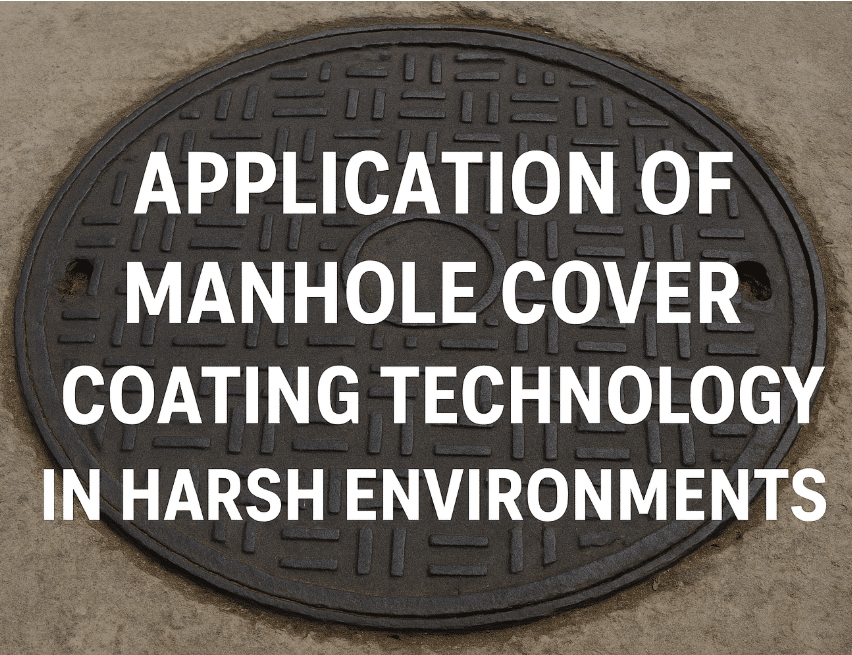Manhole cover coating plays a decisive role in extending the service life, structural stability, and safety of municipal infrastructure. In regions exposed to harsh environmental conditions—such as coastal areas, industrial zones, deserts, or regions with high freeze–thaw cycles—the surface of a manhole cover is subjected to continuous chemical, mechanical, and climatic stress. Over time, these factors accelerate corrosion, reduce load-bearing capacity, and compromise public safety. As modern cities expand and underground utilities become more complex, it has become crucial to evaluate and apply advanced manhole cover coating solutions. By integrating new manhole cover technology and protective systems, manufacturers and municipalities can significantly enhance performance, safety, and long-term resilience.
This article analyzes coating classifications, application procedures, technological advancements, and engineering case insights to help city planners, utility operators, and purchasers choose durable coatings in challenging environments.
1. Understanding the Importance of Manhole Cover Coating in Harsh Conditions
Environmental factors that accelerate deterioration
Harsh environments present multiple threats that require enhanced manhole cover protection. Chemical corrosion from salt-laden air in coastal zones can rapidly degrade unprotected cast iron surfaces. Industrial environments with acidic vapors can weaken material integrity, while desert climates expose manhole covers to extreme UV radiation, causing surface cracking or color fading. Freeze–thaw cycles in colder regions create microfractures, eventually leading to structural instability. Without a proper protective coating, even high-quality materials can experience rust, brittleness, and surface deformation, which endanger pedestrians and vehicles.
Why coating technology is essential
Advanced manhole cover coating technology forms a barrier that prevents water intrusion, chemical attack, oxidation, and mechanical abrasion. Modern coating systems not only improve durability but also enhance anti-slip performance, appearance, and load stability. Coatings significantly reduce maintenance requirements and offer a predictable life cycle, which is crucial for long-term municipal planning.
2. Common Types of Coatings Used in Manhole Cover Manufacturing
Epoxy resin coatings
Epoxy coatings are among the most widely used solutions for protecting manhole covers in corrosive environments. The coating adheres strongly to metal substrates, providing excellent resistance to acids, alkalis, and moisture. For industrial zones with aggressive chemicals, epoxy resin is often the preferred choice due to its durability and cost-effectiveness. This type of coating creates a rigid protective film, significantly extending the operational lifespan of the infrastructure.
Polyurethane coatings
Polyurethane coatings offer superior flexibility and UV resistance. They are commonly chosen for desert environments or regions with high sunlight exposure. The elastic nature of polyurethane helps prevent cracking caused by temperature fluctuations. Additionally, polyurethane enhances the aesthetic appearance of the cover by maintaining color stability over time.
Hot-dip galvanization
Galvanized coatings provide long-lasting corrosion protection by adding a layer of zinc to the metal surface. In coastal regions where salt spray is a persistent issue, galvanization ensures resistance to rust and oxidation. Its long service life and low maintenance demands make it a preferred solution for public infrastructure.
3. Specialized Coating Technologies for Extreme Environments
Ceramic-based coatings
For areas with severe abrasion, such as busy urban intersections or high-traffic industrial parks, ceramic-based coatings offer exceptional hardness and wear resistance. The coating adds a protective ceramic layer that fortifies the surface against impact and friction. This enhances both the safety and performance of manhole covers.
Nano-coating technology
Nano-coatings represent a new generation of manhole cover technology. These coatings provide hydrophobic and self-cleaning properties, making them ideal for environments with heavy rainfall or mud. By reducing water absorption and preventing dirt accumulation, nano-coatings improve long-term cleanliness and reduce maintenance frequency.
Anti-corrosion chemical treatments
Chemical pre-treatments are often used alongside coatings to neutralize contaminants and strengthen the substrate. These treatments help ensure that coatings adhere effectively and maintain integrity over long periods.
4. The Engineering Process of Applying Manhole Cover Coatings
Surface preparation
Quality coating performance begins with proper surface preparation. Techniques such as sandblasting, acid washing, or mechanical grinding remove rust, oil, debris, and old coatings. A clean, rough surface allows coatings to bond securely, improving long-term resistance.
Coating application
Different coatings require different application processes, including spray application, dipping, brushing, or thermal bonding. Each method must ensure uniform coverage, especially around edges and bolt holes where corrosion often begins.
Heat curing and quality inspection
Once the coating is applied, heat curing ensures the film achieves maximum strength and adhesion. After curing, manufacturers perform tests such as thickness measurement, hardness testing, salt spray testing, and adhesion evaluation to verify durability and environmental compatibility.
5. Performance Benefits of High-Quality Manhole Cover Coatings
Enhanced corrosion resistance
In environments with moisture, salt, or industrial contaminants, coatings serve as a protective barrier that prevents oxidation and metal degradation. This significantly reduces maintenance costs.
Improved lifespan and structural reliability
High-performance coatings increase the operational life of manhole covers by preventing surface and internal degradation. This ensures that covers maintain load-bearing capacity and comply with municipal safety standards.
Improved safety through anti-slip and visibility features
Many coating technologies incorporate anti-slip textures and color-coded finishes that improve pedestrian and vehicle safety, especially during wet weather or nighttime.
6. Case Studies: Successful Application in Harsh Environments
Coastal cities
In coastal regions, epoxy and galvanized coatings have shown remarkable performance against salt corrosion. Municipalities report significantly reduced corrosion and extended replacement cycles.
High-temperature industrial areas
Factories and industrial parks use polyurethane coatings to resist chemical fumes and thermal stress. These coatings maintain flexibility and protective properties even under constant exposure to heat.
Cold regions with freeze–thaw cycles
Nano-coatings combined with epoxy layers prevent water infiltration and cracking during winter months. This minimizes structural failures and ensures road safety.
Conclusion
The application of manhole cover coating technology plays an essential role in ensuring the long-term performance, safety, and operational efficiency of municipal infrastructure. As cities grow and environmental challenges become more complex, choosing the right protective system becomes increasingly important. Advanced coating solutions—including epoxy, polyurethane, galvanization, ceramic coatings, and nano-technologies—offer tailored protection for different environmental conditions. By understanding coating performance, application procedures, and engineering demands, decision-makers can improve the durability and sustainability of manhole covers in harsh environments.
FAQ (5 Items)
1. Why is manhole cover coating necessary in harsh environments?
Coating prevents corrosion, oxidation, and structural weakening caused by chemicals, moisture, salt, and UV exposure.
2. Which coating is best for coastal regions?
Galvanization and epoxy coatings perform best due to high corrosion resistance against salt-laden air.
3. Can coatings improve safety?
Yes, many coating technologies offer anti-slip features and enhance visibility through color-coded finishes.
4. How long does a coated manhole cover last?
Depending on the coating, environmental conditions, and maintenance, coated covers can last 10–25 years or more.
5. Are advanced coatings cost-effective?
Yes. Despite higher upfront costs, they significantly reduce long-term maintenance and replacement expenses.





